Extract from The Guardian
Australian media
How does a small handful of commentators such as Alan Jones and Ray Hadley wield political power?
As
you walk the corridors of Parliament House in Canberra, many of the TVs
in the offices are tuned to the pay TV channel Sky News late into the
night. Ministers’ and backbenchers’ offices, and even the cafe down the
hall, echo to an anxious call to arms from the same political quarter –
the right wing of the Liberal party. It’s here that you’ll find climate
change denial, sexism and racism
aired with regularity. And then there’s Peta Credlin, still haunting
parliament, driving home the same message that led to Tony Abbott being
ousted as prime minister.
There are others too; Alexander Downer’s former media minder Chris Kenny, Andrew Bolt and Paul Murray, recently in the news for his “hot mic” confession that “Sky News at night is a Liberal party echo chamber”. As if to emphasise the point, shortly after Murray was outed, the Liberal MP Craig Kelly, famous for saying that burning fossil fuels protects us, and equally famous for threatening to move to the crossbenches if he didn’t get preselection for his New South Wales seat, joined the Sky team, replacing Ross Cameron, the former Liberal MP who was sacked for his offensive descriptions of Chinese people. This followed the sacking of the controversial former Labor leader and now One Nation politician Mark Latham in 2017.
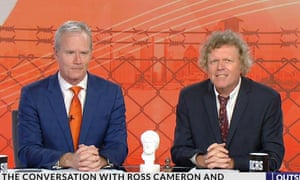
There are others too; Alexander Downer’s former media minder Chris Kenny, Andrew Bolt and Paul Murray, recently in the news for his “hot mic” confession that “Sky News at night is a Liberal party echo chamber”. As if to emphasise the point, shortly after Murray was outed, the Liberal MP Craig Kelly, famous for saying that burning fossil fuels protects us, and equally famous for threatening to move to the crossbenches if he didn’t get preselection for his New South Wales seat, joined the Sky team, replacing Ross Cameron, the former Liberal MP who was sacked for his offensive descriptions of Chinese people. This followed the sacking of the controversial former Labor leader and now One Nation politician Mark Latham in 2017.

According to Burrowes, Sky is “two channels – the balanced and respected channel” during the day hosted by esteemed journalists such as David Speers but “after it gets dark it is very different”. It might not be a full-blown copy of Fox News in the US but many believe it is heading in that direction.
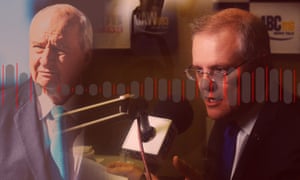
Deciphering exactly how many people are listening, though, can be difficult. Perhaps unsurprisingly, radio stations prefer to quote figures that boost their numbers.
During the radio survey published last month, Jones boasted an audience of 432,000 in Sydney and 90,000 in Brisbane. (Snippets of his program are also broadcast on 70 radio stations nationally.) That means that more than half a million people tuned in at some time during the program for eight minutes or more. But the average audience for Jones during his breakfast show is not so impressive, just 161,000 in Sydney and 28,000 in Brisbane.
Chris Mitchell, the former editor-in-chief of the Australian newspaper, who made his name as a partisan warrior on the right, said the success of broadcasters like Jones and fellow conservative 2GB radio host Ray Hadley was in part due to “confirmation bias”. People liked to hear “opinions they agreed with”.
"The political climate means that Gladys Berejiklian has a completely different fight on her hands."
The former NSW premier and now Labor senator Kristina Keneally provides some insight into how to handle Jones and his rightwing ideology. As premier, between 2009 and 2011, her office set up a special desk, tasked with keeping an eye on the subjects that were of interest to Jones and Hadley. Hadley attracted 326,000 listeners (average 130,000) in Sydney and 77,000 (average 26,000) in Brisbane during the last ratings period.
The current NSW government has not been so lucky, and the political climate means that Gladys Berejiklian has a completely different fight on her hands.
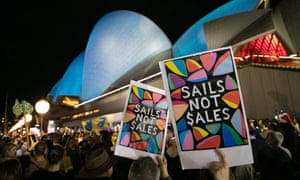
Last October Jones attacked the chief executive of the Sydney Opera House, Louise Herron, for refusing to allow the building’s sails to be used to advertise the barrier draw for a $13m horse race being run at Randwick. Jones’s bullying rant against her had barely subsided when Berejiklian caved in and gave Jones what he wanted. This was more than just the intersection of high art and a horse race. It was a metaphor for what has been called the struggle for the soul of the Liberal party of Australia, a battle between the middle ground and the authoritarian right.
Fox News-style ‘shock and awe’
As one of the first Liberal party MPs to speak out against the influence of the hard right inside the party, and the role of Jones and Sky in fomenting what’s been described as the toxic atmosphere in federal politics, Craig Laundy struggles to understand why the party is on a course he believes could make it unelectable.“The reality of politics, especially as a marginal seat holder, you need 50% plus one to get elected and that’s just in your seat,” he says. “But you need then 50% plus one of the total of seats, which is 150 at the next election, to form government. Now you are not going to get that by lurching hard right. You’re just not.”
Laundy, who first won Reid – until then a traditional Labor seat – in 2013 with a narrow 0.8% victory, increased the margin to 5% at the 2016 election. But while Laundy has managed to turn Jones’s attacks – he called Laundy a Turnbull sycophant – into a political advantage in an electorate where Jones doesn’t have much support, others haven’t been so lucky.
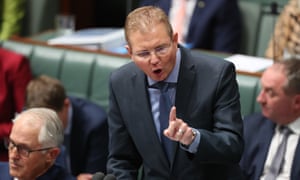
The power of Jones, Hadley and Sky is not how many viewers and listeners they influence but the effect they have on the party branch members who then pressure their MPs. Laundy believes Sky is “going for that Fox News-style US shock and awe because there is definitely a market for it”. And although that market is small, the reason many of the Liberals watch Sky so closely is because it is influential with the activist members of their branches, particularly in marginal seats. Laundy counts himself lucky because “most of my branches are moderate”.
The result of the Longman byelection in Queensland this year, a seat the Liberal-National party (LNP) had hoped to win from Labor, was a catastrophe for the government that saw the LNP’s primary vote collapse. Such a disaster might have persuaded the Liberals to move towards the middle ground but instead they shifted in the opposite direction – eventually dumping their leader, Malcolm Turnbull. The far right candidate, Peter Dutton, received a sizeable 35 votes – with more than a third of the Liberal party’s parliamentary caucus supporting him – before Scott Morrison emerged as the “compromise candidate”. The pressure on MPs from their party members to support Dutton had been unrelenting. In the Queensland seat of Petrie, adjacent to Longman, branch members put extraordinary pressure on their local Liberal National party member, Luke Howarth, after they had received “a relentless pounding from Sky News after dark”, according to Laundy.
"Our side of politics spends their whole time in their offices with Sky News playing in the background."
As he told Guardian Australia’s political editor, Katharine Murphy, recently: “The part that gets missed for people outside Canberra … is when you are in Parliament House, our side of politics spends their whole time in their offices with Sky News playing in the background, and you are watching colleagues going head-to-head with Labor on policy, but once it gets to 6pm it goes from panel-style shows to commentary shows.
“Look that’s [Sky’s] business model. It isn’t sour grapes. They are entitled to do this. They are trying to go the Fox News, US-style controversial rightwing shake-it-up … and a lot of my colleagues take what they say as gospel.”
And they are, he said, “signals that don’t appropriately reflect the middle ground in Australia”.
Howarth argues that while not every politician is influenced by Sky or talkback radio it is different “when leadership spills are on”. He says Hadley was encouraging people to contact their local member to say they wanted Dutton. Howarth received 30 calls urging him to support Dutton. He says he was going to vote for Dutton anyway.
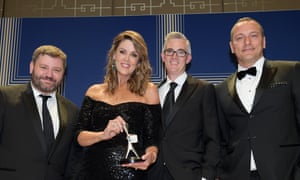
The problem with Turnbull, according to Howarth, was that he did not meet his own key performance indicators. Turnbull had said 30 polls was too many for Abbott and that is why he had challenged him. “We let him get to 38 before deciding to spill.”
The greater problem, according to Howarth, is that although he believes his voters are “traditional Libs” the push to the right – enthusiastically supported by Jones, Hadley and Sky – might encourage them to switch their vote to another party like One Nation. At the last Queensland state election, One Nation “gave its preferences against all sitting members”. If they put up a candidate in his seat at the next federal election and did the same again it would make his 1.6% margin extremely vulnerable.
Very few Liberal party MPs would speak on the record about the pressure they came under from Sky, Jones and Hadley but, as one MP pointed out, with strong support for Dutton in the first spill “if you want to get on in the Liberal party you will need [the conservative right’s] support”.
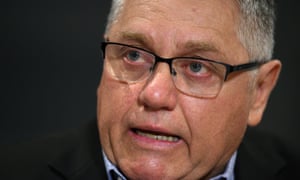
Another Liberal MP from Victoria, who declined to be named because of the impact it might have on their preselection, agrees. The MP says the problem with Sky after dark is that it is basically a small, narrow group of people talking to a small, narrow, group of people who happen to be influential in the National and Liberal parties. These party members spout back extremist arguments to their MPs who are “completely spooked by it”, and are easily swayed on climate change and refugee policy.
“The problem is that we have to get preselected,” the MP says. “They say ‘you are a communist’ if you stand up to them.” There are also direct policy implications. Sky, Jones and Hadley have influence over MPs “who don’t have strong views”, the MP says.
Some Liberals, though, still hold to the party line. MP Ben Morton, the former director of the West Australian Liberal party, believes there is less respect today allowing “discussing of opinion and thought”. He says the criticism is equally valid “on one side of the political spectrum as on the other”.
The bush expansion
As News Corp implemented a full takeover of Sky in 2016, the rightward lurch was being watched over by Lachlan Murdoch from New York, apparently the only person with a Foxtel set top box outside Australia. It seems, like his father, Lachlan is anything but a passive viewer, and, according to some, further to the right. Murdoch has a “great interest in what is going on at Sky – particularly after dark”, one observer noted. There appears to be no mystery about the direction from New York.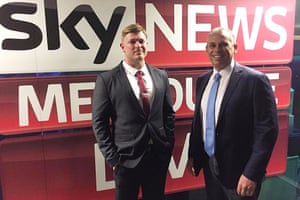
Sky has teamed up with Win TV to broadcast across the company’s regional network from South Australia, regional Western Australia, Tasmania, regional Queensland and NSW. There is a possible audience reach of 7.813 million. Even though, unlike the Sky News channel, the programs are free-to-air, the audience figures so far suggest there is much work to be done bringing to the bush the kind of anti-migrant and climate change denial arguments that have so destabilised the Coalition government.
"The tough on crime, anti-migrant campaign in Victoria, backed by the Murdoch papers and Sky, dramatically failed."
Meanwhile there has been speculation that Jones’s 2GB contract – worth a reported $4.5m a year – may not be renewed, although other reports suggested this was just a matter of timing, with his contract up for renegotiation just as the Fairfax Media takeover by its new owners, Nine Entertainment, was happening. Nine, who got Jones as part of the package, will have to weigh up if Jones and his behaviour, which led to a recent $3.7m defamation payout, is worth his massive salary.
There is also the result of the Victorian election to take into account. The tough on crime, anti-migrant campaign, backed by the Murdoch papers and Sky, dramatically failed to persuade the electorate. But then again, the Liberal party it seems has not been listening to the electorate; it’s been watching Sky after dark and there’s little indication it’s going to change the channel.
• Paul Whittaker, the CEO of Sky News, was contacted for this story
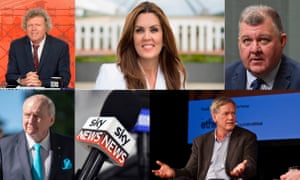
No comments:
Post a Comment